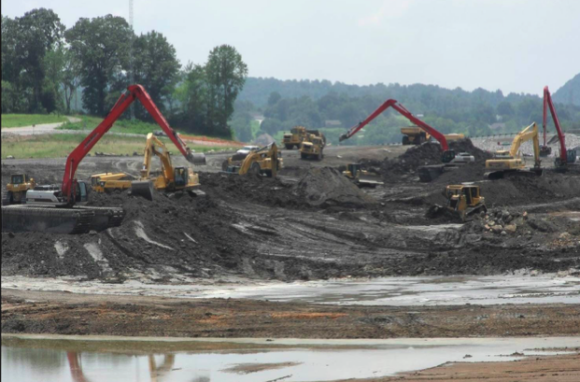Sovereign immunity does not protect a federal contractor against a lawsuit filed by some 60 former employees seeking $3 billion in punitive damages for illnesses suffered after exposure to toxic coal ash during a clean-up project, a federal appellate court ruled.
The decision released Wednesday by the 6th Circuit Court of Appeal clears the way for a jury trial to determine the amount of damages owed to workers who fell ill after removing tons of sludge that had spilled out of a storage pond outside of a coal-fired power plant owned by the Tennessee Valley Authority. A federal jury ruled in 2018 that Jacobs Engineering Group failed to exercise proper care and may be responsible for the cancers, lung disease and other ailments suffered by the plaintiffs.
Lawyers for Jacobs Engineering had argued that the lawsuit is barred by sovereign immunity, a doctrine that holds government cannot be sued without its consent. While Jacobs is a private business, the company argued that it is protected by “derivative immunity” because it was doing the government’s work.
US District Court Judge Thomas A. Varlan dismissed Jacobs’ motion for summary judgment, finding there was ample evidence that the contractor did not comply with the terms of its contract with the Tennessee Valley Authority.
A panel of the 6th Circuit Court of Appeals affirmed the decision. The panel said it did not consider whether workers’ compensation exclusive remedy barred the suit because Jacobs did not raise that issue in its appeal.
The Tennessee Valley Authority hired Jacobs to remove slurry that spread across 300 acres and covered 12 homes after a containment dike surrounding a pond that stored ash produced by its Kingston Fossil Fuel Plant ruptured on Dec. 22, 2008. The Pasadena, California-based company was paid $60 million for the work, according to the Knoxville News Sentinel.
Workers and their family members filed 10 lawsuits against Jacobs, which were consolidated in the US District Court for Eastern Tennessee. They alleged the company failed to warn its workers about the damage that can be caused by the toxic chemicals in coal ash. Managers refused to allow workers to wear protective equipment “because they were afraid the general public seeing these items being worn would stimulate more property-related lawsuits,” the lawsuit says.
The lawsuit asks for $50 million in compensatory damages, $25 million in punitive damages and $3 billion in punitive damages.
Initially, Varlan ruled that the court had no jurisdiction, but the 6th Circuit reversed.
On a second go-around, Varlan bifurcated the case and asked a jury to decide if Jacobs should be held generally liable in the case. A second trial, which has not been held, will determine if Jacobs caused specific injuries to specific plaintiffs and assess damages for each.
Jacobs appealed the jury verdict, arguing that the damages would amount to a “grave interference with the performance of a governmental function. “The company said the TVA “will struggle to find contractors in the future if the court does not consider Jacobs immune because those contractors could be liable for significant tort damages,” according to the opinion.
The appellate panel said that Jacobs’ argument is based on speculation and there is no caselaw to support it. The US Supreme Court had held that the TVA is a hybrid organization that performs both commercial and governmental functions, and that it can be sued for its commercial activities.
“No private power company could be designated as the ‘lead agency’ of a cleanup,” the opinion says. “But a private power company can be required to clean up environmental damage of its own making.”
Moreover, the panel said that Jacobs would not have to contend with a lawsuit if it had complied with the terms of its contract with the TVA.
The TVA argued in a separate amicus brief that the a finding for the plaintiffs would be inconsistent with the Tennessee’s workers’ compensation law. The 6th Circuit panel decided not to consider that argument.
“Plaintiffs never had an opportunity to respond to the workers’ compensation argument because Jacobs forfeited the affirmative defense,” the opinion says. “Rendering a decision based on the workers’ compensation argument would therefore be unfair to plaintiffs.”
The civil complaint states the plaintiffs were independent contractors or worked for subcontractors, which may explain why the exclusive remedy argument wasn’t raised.
About the photo: Backhoe excavators and trackhoes remove coal ash that spilled through a ruptured dike near the Kingston Fossil Fuel Plant. Photo courtesy of the Tennessee Valley Authority.
Was this article valuable?
Here are more articles you may enjoy.


 Building Fortification And The Role of The Insurance Industry
Building Fortification And The Role of The Insurance Industry  Walmart to Pay $100 Million to Settle FTC Case on Driver Wages
Walmart to Pay $100 Million to Settle FTC Case on Driver Wages  Explosive Wildfires Surge Through Oklahoma Panhandle and Kansas
Explosive Wildfires Surge Through Oklahoma Panhandle and Kansas  Moody’s: LA Wildfires, US Catastrophes Drove Bulk of Global Insured Losses in 2025
Moody’s: LA Wildfires, US Catastrophes Drove Bulk of Global Insured Losses in 2025 